Abstract
The aim of this research is to investigate, comprehend, and construct the orchestration of performance of Advanced Technology Investment Company; in order to do so, the paper first focuses on the significance of the study, the background of ATIC, the ‘vision and mission’ of the business, the key achievements of ATIC, as well as the key initiatives it has undertaken. In order to investigate the topic deeply, the paper will depict the key assumptions and exemplify the research questions, performance attributes, and the orchestration process of the human resource model of this company.
Subsequently, the paper will outline the theoretical framework for orchestration of performance, the importance of orchestrating performance with cloud computing for ATIC, the possible benefits of the company from orchestrating performance with hybrid cloud model, the collaboration enabled orchestration system, supply chain orchestration method, and the barriers to supply chain of this company.
On the other hand, the paper will also put forward a new propensity for a smarter supply chain, together with the solutions regarding performance orchestration with cloud computing system; in addition, the ensuing portions of the paper will deal with the data collection segment, where data collection method and the data analysis method will be scrutinised. At the final stage, the paper will draw the major findings accumulated from the data analysis, which will be followed by the key solutions, appropriate recommendations for ATIC as well as apposite concluding observations.
Introduction
In the era of globalization, the high-tech industry has expanded in the global market and multinational companies in the semiconductor industry have intended to penetrate into new markets to develop business performance. At the initial stage of business operation, the market players of the semiconductor industry showed positive attitudes towards the market condition, but the executives of the multinational companies had realized within very short period that the worst may be behind the industry; additionally, they identified several business risks by addressing future challenges, which may threaten their existence in the marketplace.
In this context, Advanced Technology Investment Company, being such a successful player in the global market, should now also focus on orchestrating of performance by means of different IT tools, which, for example, may include cloud-computing tools as well. It is very much significant to note that by doing this the company will not just be able to carry on its successful operations in the global periphery, but also be able to turn into the market leader in the global semiconductor industry.
Background of ATIC
According to the report of Balakrishnan & Moonesar (2012, p.3), ATIC is a wholly-owned subsidiary of Mubadala Development Company from 2011; however, ATIC started its operation in 2008 with the intention to diversify Abu Dhabi’s economy by investing in high-technology segments; the primary objective of this company is to become the market leader of global semiconductor industry. At the same time, the government of the UAE always focuses of diversification of national economy to reduce pressure on the fossil fuel; as a result, the local government of Abu Dhabi designed the strategic plan 2030 in order to develop economy, which was one of the prime factors to establish ATIC.
Muller (2009, p.1) pointed out that while the global financial crisis in 2009 had thrown the semiconductor industry into a new challenge of sustainability, ATIC demonstrated its dare to establish a new semiconductor manufacturing plant in the ‘Silicon Valley Technology Park’ with an investment of US$ 3.3 billion that ultimately came into operation in 2012 by being bannered as GlobalFoundries. According to the annual report of 2012 of Mubadala, ATIC acquired full ownership of GLOBALFOUNDRIES (GF), which become second largest company in semiconductor industry in terms of revenue; however, ATIC and Advanced Micro Devices (AMD) applied joint venture strategy in order to establish GF in 2009 (Balakrishnan & Moonesar 2012, p.4).
Here, it is important to state that AMD was the designer of innovative microprocessors and graphics solutions; in addition, AMD was one of the main customers of GF (Mubadala 2013; and Balakrishnan & Moonesar 2012, p.5). Conversely, ATIC is a major player of global semiconductor industry, which implements different strategic plans in order to reach business objectives; however, the following table gives more information about the initiatives of ATIC to become market leader in global market:
Table 1: Key initiatives of ATIC. Source: Self generated from Mubadala (2013)
Key achievements of ATIC
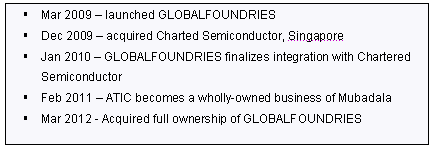
ATIC is the most momentous economic diversification vehicle of Abu Dhabi that has boosted and energized the government by means of the alignment of its strategy with long-term management of partnership, rigorous capital investment, and higher financial return on investment to deliver strong financial returns and tangible socio-economic benefits for the people, accelerating economic growth and diversification of the country.
Mission of the company
Advanced Technology Investment Company has always suggested that it was formed with mission of generating an international technological-assortment and branching out financial system of Abu Dhabi within 2030; however, it is essential to state that ATIC has already succeeded adequately in attaining its goals per annum; moreover, to ensure that is attains its mission by 2030, more improvement is needed.
Vision of the company
According to ATIC (2014), the vision of ATIC is to be the medium by which the IT and semiconductor market of the country would become flourishing and would see the face of rapid progression; it also has vision of executing revolutionary schemes in respective segment, stimulate research within UAE and enlarge talent-base to attain the national target to be knowledge-based-economy.
Significance of the Study
The management teams of the companies usually expend large funds due to change in the business performance, as orchestrating performance is an important factor in the era of open market economy. On the other hand, Balakrishnan & Moonesar (2012) stated that it is essential for ATIC to allow transformation to build strong control over the target customers, suppliers, and other inventory management system; however, this research will help the company identify a new model of automated management function.
At the same time, there are many articles on orchestration of different companies in different industry, but there is no single research on orchestrating performance of ATIC to gain competitive advantage over the competitors in the semiconductor industry with the use of automated, synchronized, and complex computer systems.
Assumptions and research questions
The key assumptions and research questions of this project include –
- Assumption 1: The extent to which orchestrating supply- chain management system can deal with the aforementioned barriers of ATIC
- Assumption 1: How it works to achieve visibility and intelligence to make a well-organized and purchaser-focused supply chain, which reduces expenses and minimize challenges
Literature Review
Theoretical framework for orchestration of performance
Erl (2008) has pointed out that orchestration of performance of a business can be defined as programming of procedures, and harmonization and administration of multifaceted computing techniques, facilities, and middleware; orchestration may possess intrinsic aptitude and completely independent dominion, which are mostly endeavours or resemblances; to be frank, it is the outcome of computerization of processes by installation of control-theory.
Erl (2008) has further added that orchestration of performance is all about lining up the company with functions, records, and transportation; moreover, orchestration describes the courses of action and facilities by programmed working practices, reasoning, and alteration of administration; additionally, it makes a purpose allied infrastructure, which could be ranged upward or downward focusing on the requirements of every purpose.
Sadiq & Racca (2010) put forward the idea that orchestration offers innermost administration of assets, comprising scheduling, estimating, and charging for usage; it also lowers wastage of time and labour for installing manifold illustrations of single-function; in addition, with rising need for administering a mounting amount of assets, orchestration of performance, or in other words, automation of infrastructure, became vital.
The following figure shows what orchestration is all about; it specifies that before the orchestration of performance is put into practice, a number of different factors should be kept in mind; it is important to note that this predominantly requires the companies to answer a set of questions before they undertake this basic transformation inside the traditional operational processes:

Onisick (2011) has amazingly noted a very important thing, which suggests that in the modern world, the most crucial method of orchestration of performance is the automation of all the activities of a firm by the means of cloud computing; cloud-computing has established complementarily precise definition of workflow and processes, where every company will get a comprehensive infra-structural model.
As Onisick (2011) and Sadiq & Racca (2010) noted in their respective studies, cloud computing, in one hand supervises the internal procedures inside firm and on the other hand, handles procedure to acquire extensive regional network of functions; additionally, the researchers described an orchestrating body as the one who directs multifaceted intersect domains, for example, organization, endeavour, firewall, works, etc. Sadiq & Racca (2010) and Onisick (2011) further added that cloud computing orchestration as a result can be defined as the arrangement of structural design, equipment, and procedures exploited by individuals in order to convey some definite facility; it would also involve mending hardware and software gears collectively for offering that explicit facility, or linking or computerizing the workflow relevantly.
Loesgen (2014) has pointed out in his study that cloud computing is decisive for orchestration of performance as cloud computing would be able to improve at random pace and with vitality; there is no need of straight involvement of any individual for the purpose; cloud computing comprises assertion of success and accountability and necessitates assortment of technological or corporate domains.
Loesgen (2014) further noted that orchestration of performance through cloud computing would involve a reorganisation of processes by the means of automation of various services and facilities as well as modernisation of data centres, operations and other functions. This has been briefly shown in the figure below, which states how the processes should be arranged and into what parts the procedures should be divided so that the entire endeavour to incorporate orchestration of performance turns out to be a success:

Orchestrating Performance of ATIC
In order to automate the processes, it should require huge investment on R&D, but the national government allocated comparatively low budget to serve this purpose; as a result, it becomes difficult for the management of ATIC to identify the risks and collaborate the tasks. On the other hand, Balakrishnan & Moonesar (2012) stated that this company had faced severe challenges to find out experienced and professional expert from the local people; so, it has to rely on the expatriates to automate the processes using latest software.
At the same time, the government of this country had not yet established any institute to offer decree course on micro processing; in this context, ATIC has already taken many initiatives to joint venture with different universities in the UAE. However, ATIC had successfully orchestrated the tasks of the company in different sectors where the management, specialists, engineers and other employees have played significant role to use the resources and measure the performance.
Hruska (2012, p.1) added ATIC along with its subsidiary ‘GlobalFoundries’ are struggling to attain the numbered one semiconductor company in the world, while the most powerful competitor Intel is going to launching 22 nm parts, the company is struggling in the market with 32/28 nm designs of semiconductors, which is backward then the Intel introduced. At the same time, Intel proclaimed its challenge in the market that there is none to bit its existing process nodes running in the market; such proclamation of Intel indicates huge gaps of ATIC and GlobalFoundries in the semiconductor market, which is very emergence to address immediately.
At the same time, other market players like Samsung and IBM have agreement with GlobalFoundries for research and development while the others TSMC, and UMC came to outsourcing their needs from GlobalFoundries. Therefore, IBM (2009, p.2) pointed out that the competition is gradually increasing in the first moving advanced technology based Hi-tech companies; consequently, it becomes very difficult to sustain in this market without monotonous and extra ordinary performance or manipulated reputation through propaganda.
Methodology
The purpose of this part is to design a research framework to scrutinize the topic (orchestrating performance of ATIC); therefore, both primary and secondary data sources will be used to analyze the problems related with business operation system in the global market.
Data Collection Method
A questionnaire has prepared based on both qualitative and quantitative research methods to carry on interview through modern equipment to analyze the orchestrating performance of ATIC in the semiconductor industry; the sample size is 100 including employees, specialists, and managers.
Data Analysis Method
This report will chiefly consider a mixed research approach, for instance, the secondary data will be analyzed using descriptive research method while the primary data will be described using analytical research approach; however, the following figure shows data preparation procedure to illustrate the orchestrating performance of ATIC:
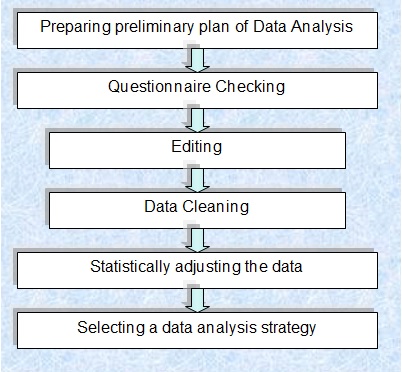
Findings
Brief job description of the interviewees
This is a formal question to know about the interviewees; here, most of the respondents are the employees of ATIC and they perform in different departments and carry on both technical and administrative responsibilities.
To what extent you agree that SCM system of ATIC is running well
Most of the employees have no idea about the entire process for which more than 25% of the total respondents said that they are not agreed with the statement where as 35% respondent strongly agreed with the statement that ATIC is running well with existing SCM system. On the other hand, the managers of engineering department, who are responsible for the orchestration provided supplementary comment and argued that existing SCM system of ATIC has successfully coordinated the tasks, but it needs to adopt new technologies to face challenges and reduce costs. In the support of this question, the managers of engineering department and other employees provide positive feedback, but only have no opinion in this regard; however, the next graph represents whether SCM system of ATIC is running well or not:
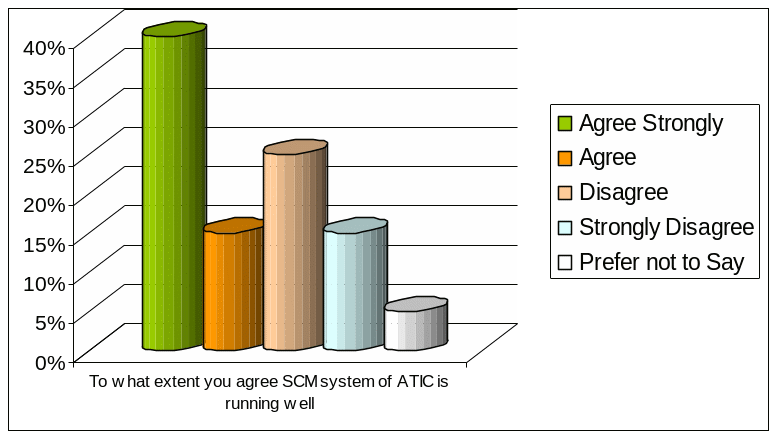
To what extent you agree the SCM system of ATIC is very complex
According to the survey, report on orchestrating performance of ATIC, highest 35% of the total respondents strongly agreed that the SCM system of ATIC is very complex, 25% respondents have just agreed with the statement. On the other hand, 23% of the employees of engineering department strongly disagreed with the statement and 10% employees have just agreed with the statement and rest 3% respondent have no opinion; however, the next graph represents whether SCM system of ATIC is very complex or not:
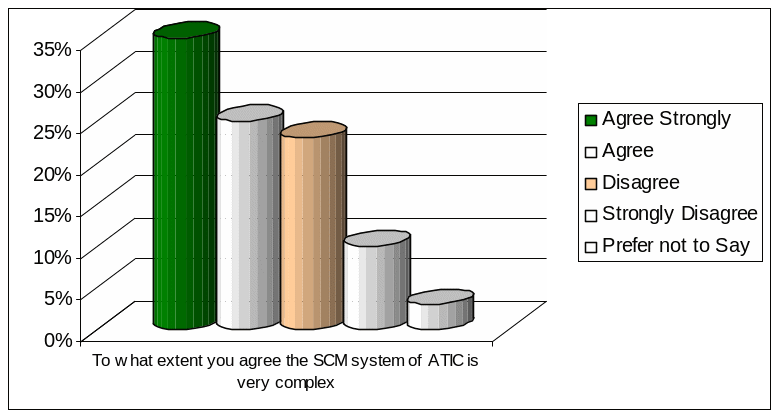
To what extent you agree that the employees of ATIC able to adopt new technologies
According to the survey, report on orchestrating performance of ATIC, highest 15% respondents strongly agreed that the employees of ATIC able to adopt new technologies, 24% respondents have just agreed with the statement. On the other hand, 47% of total respondents strongly disagreed with the statement and 12% employees have just disagreed with the statement and rest 2% respondent have no opinion; however, the next graph represents whether the employees of ATIC able to adopt new technologies not:
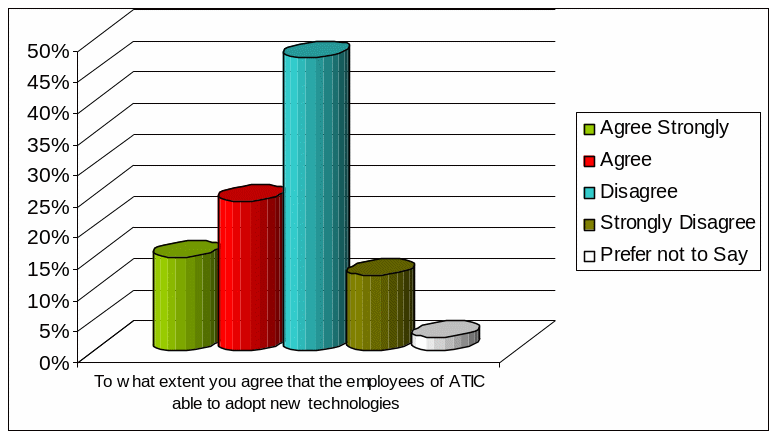
To what extent you agree that orchestrating management system improve business performance of ATIC
In the support of this question, about 45% of the total respondents strongly agreed that orchestrating management system improve business performance; in addition, 20% respondents have just agreed with the statement and 5% respondents have no idea about management system. On the other hand, 15% of the total respondents strongly disagreed with the statement and 10% employees have just disagreed with the statement that orchestrating management system improves business performance of ATIC; however, the next graph represents the result:
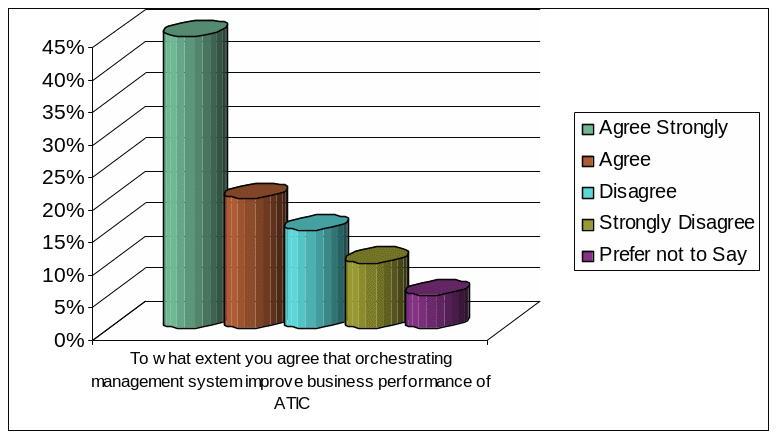
To what extent you agree that Orchestrating SCM system increase profit margin of ATIC
In accordance with the survey report on orchestrating performance of ATIC, about 35% of the total respondents strongly agreed that orchestrating management system improve business performance; in addition, 25% respondents have just agreed with the statement and 5% respondents have no idea about management system. On the other hand, 15% of the total respondents strongly disagreed with the statement and 20% employees have just disagreed with the statement that orchestrating management system improves business performance of ATIC; however, the next graph represents the result:
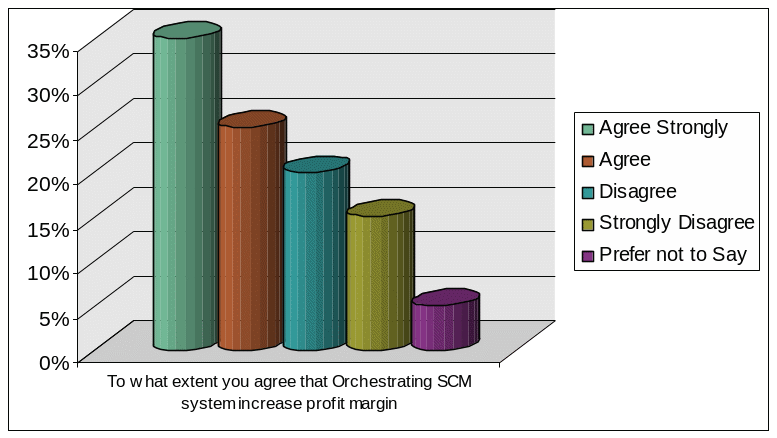
To what extent you agree that orchestration of performance with cloud computing is highly important if ATIC wants to further improve its business performance very efficiently from all spheres?
This question was put forward to see whether the respondents feel that orchestration of performance, particularly by the means of ‘cloud computing’ is extremely essential if the company would like to promote the enhancement of its performance extraordinarily and cost effectively from all angles. It is highly important to note that in answering this question, about 65% of the total respondents strongly agreed that orchestration of performance with cloud computing is highly important if ATIC wants to further improve its business performance. In addition, 25% of the respondents had just agreed with the statement and 5% respondents had no idea about orchestration of performance with cloud computing. On the other hand, none among the total number of respondents strongly disagreed with the statement, but 5% of the employees had just disagreed with it; this has been shown in the graph below:
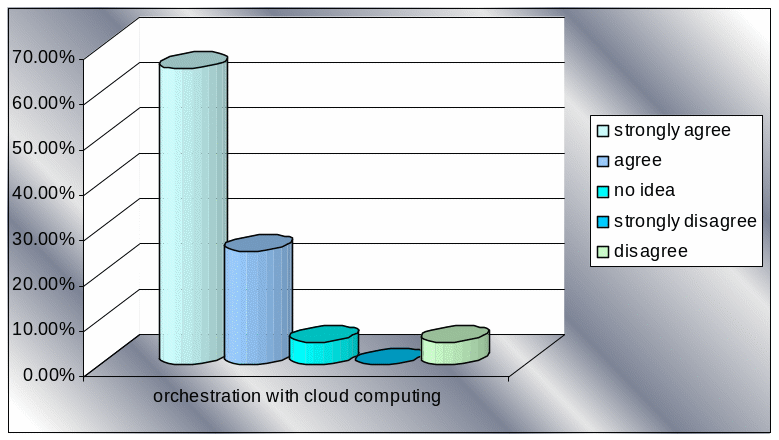
Barriers to Supply Chain of ATIC
According to Advanced Technology Investment Company, it faces several obstacles in supply chain management; a number of familiar obstacles for example, include absence of calculability, legal obligations, volatility, imperfect data, limited optimisation, and so on. Absence of calculability arises when the supply chain engenders a remarkable quantity of statistics on the workplaces of the company, which includes production units, value assessment and supervision units and enterprise resource planning systems as well as accommodating submissions; this statistics allow administrators to carry out profound research on a number of features of the day to day running.
In addition, even though most enterprise resource planning systems afford vital coverage abilities; such descriptions and submissions are occasionally sufficiently adaptable to deal with precise queries or instant requirements; on the other hand, they do not cover the complete supply-chain; as a result, a great deal of storages of statistics gather which do not allow apparent outlooks of the supply-chain. Advanced Technology Investment Company noted that the capacity to pursue a procedural practice that starts from bringing unprocessed matters to supplying refined end items for consumption of buyers is decisive indeed; nevertheless total quantity of statistics makes this tricky to attain; statistics also arise from buyers and suppliers and each of these sources of statistics contain individual diligences and information-storages.
Volatility is a great problem because the more assertively a director can assess demand, capacity, expenditure, and goals, the better he or she can safeguard vendors and manufacturing procedures; however, changeability brings about disparity amongst forecasted and real outcomes; conversely, if volatility remains untreated, the trouble is highly probable to arise again with sustained damaging influence on the supply chain.
Jharkharia & Shankar (2005) jointly pointed out that these barriers in supply chain management proliferate if the company is trying to introduce and work with IT enablement of a supply chain; it is very important to note that the authors outlined the key troubles, which firms like ATIC experiences when technologically upgrading and modifying the entire supply-chain. All these factors are briefly illustrated in the chart below, which is worth considering for all related businesses, suppliers, and even customers:
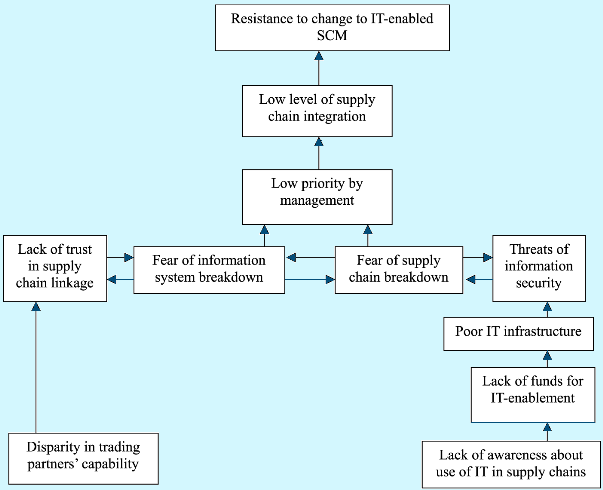
New intelligence for a smarter supply chain
In order to bring about new intelligence for a smarter supply chain, it is highly essential for Advanced Technology Investment Company to focus on a number of different factors. It is highly notable that Ennulat (2013) has pointed out that in order to give rise to innovative aptitude to generate a smarter and efficient supply chain, the modern world has looked forward to three key technologies, which could assist Advanced Technology Investment Company to set up a competent, flawless, and combined management of supply chain.
By adapting cloud computing, for example, it is possible to obtain benefit of effective phases of employing IT transportation and improving middleware capacities and cooperation enlargement with outsiders; moreover, sophisticated analytics could willingly construe huge amount of records to allow swift and competent reply; conversely, it will allow information to be retrieved at any time for better assessments and actions. The figure below shows how adopting cloud computing in the delivery systems could result in smarter supply chain and more enhanced performance:

Collaboration Enabled Orchestration
Ennulat (2013) has pointed out that technology permits continuous efficiency development throughout the entire supply chain; as a result, in the upcoming years, companies will have a rising number of supply chains operating with the least amount of human control; like information networks, for example, the cloud computing systems, they would be capable to computerize, reorganize, and orchestrate the operations.
Additionally, Ennulat (2013) has further expressed that progressive firms such as ATIC, which extracts benefit out of it, would be able to control future markets; on the other hand, to attain the formerly unattainable altitudes of competence and swiftness, decision-makers will need to think fundamentally, which marketplaces, functioning sculpts, and value formation methods will be used.
Supply Chain Orchestration Method
It is important to note that in order to orchestrate the supply-chain, a number of different techniques and platforms can be used; according to GT Nexus (2014), it would convey fully integrated supply-chain technique to work with huge number of enterprise resource planning systems and WMS-oriented systems to manage in-bound and out-bound-transport surges and offer efficient control to companies worldwide. The figure below briefly shows how this supply-chain orchestration process works in order to bring about successful outcomes; it is clearly visible that this orchestration method incorporates many aspects into its model to make it comprehensive and smart from all arenas:
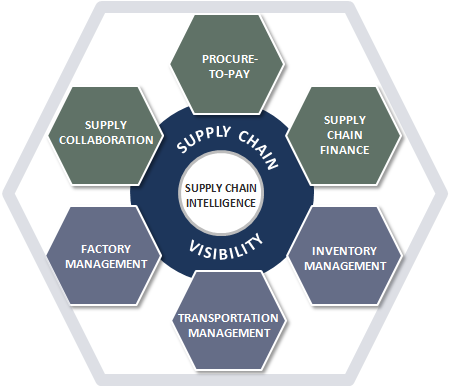
On the other hand, DeAngelis (2011) has wisely pointed out that for companies like Advanced Technology Investment Company, only a single stakeholder can orchestrate supply chains at a time; however, this task would involve choosing vendors in diverse levels, purchasing on behalf of multifarious levels, procedural enhancements in those levels, observance programmes and reviews, as well as multi-level supply-chain risk-management. These different stages and processes are briefly outlined in the figure below; it clearly shows that choosing the correct strategy at the correct stage, which, for example, include reaction, anticipation, collaboration, and orchestration, would bring about huge success in longer term:
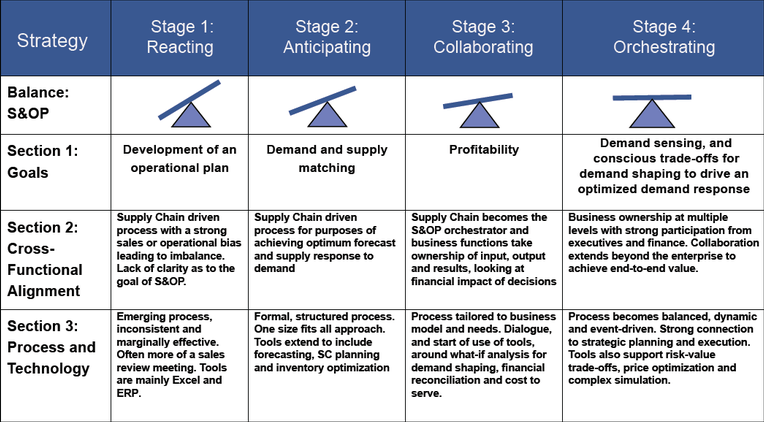
Solution and implementation plan for ATIC
SCM initiatives synchronize demand and supply, control inventory, swift assessment of supply chain performance, recognize performance gaps, and give better visibility into the manufacturing functions; however, this research paper focuses on the use of IT solutions and find out the most suitable IT solutions for the business operation of ATIC.
The effective SCM requires supply products in perfect quantity, condition, documentation, time, price, and place; however, this SCOR framework will help ATIC to measure present condition and business performance to control the problems related with costs, performance trade-off, and implementation of strategy to reach business objectives and meet market demand. It is important to mention that ATIC faced challenges to increase investment in the innovation, projects, and plant to control costs; at the same time, operating costs are increasing due to volatility of freight price, new technology integration, boost salary, healthcare expenditure, and increasing prices of raw materials.
In this context, SCOR metrics offer critical measurement option to assess SCM performance by comparing with other solution in the global market. In addition, ATIC needs to redesign the entire process time-to-time for many reasons, such as, new product development, outsourcing, acquisitions and joint venture, financial accessibility, compliance with intellectual property law, asset management and security concern; nevertheless, ATIC coordinates the functions by assessing risks and creating plans for faster implementation to provide relief clients, suppliers, and all stakeholders. On the other hand, ATIC uses different languages for different purposes, but the new software will give the opportunity to overcome this problem of communication; therefore, it will be easy for this company to evaluate the performance and speed benchmark efforts.
Performance Attributes
SCOR categorizes key supply chain performance attributes; however, the following table gives more information in this aspect-
Table 2: Performance Attributes. Source: Self generated from SCC (2010, p.8)
However, the following figure shows the Score Model, which contains five level 1 management processes:
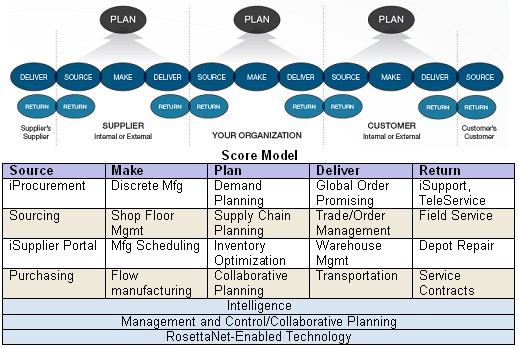
In the above figure, plan (P) procedures illustrate the planning functions connected with operation management and SCM, such as, gathering information about requirements of the customers and finding loopholes. However, source procedures explain order scheduling and make procedures indicate all types of material conversions; on the other hand, deliver procedures explain the tasks related with fulfilment of customer orders and return procedures indicate the reverse flow of the products back from the customer.
The Orchestrate HR model of ATIC
This company is talent driven for which it is recruiting the brightest and most capable candidates to build a team as the employees have to play significant role to manage more than $40 billion assets and to generate about $3.5 billion sales income (Mubadala, 2013, p.87; and Balakrishnan & Moonesar 2012, p.5). However, the leaders of this company focused more on the trained employees to find outstanding employees to share common organizational objective to perform as a team by giving the best effort; however, most of the young talent employees are innovative and creative thinkers
In accordance with the report of Balakrishnan & Moonesar (2012, p.3), ATIC has conducted a survey to know about the experience level of the human resources, which demonstrated that only 13% human resources were engineers and they have five years experience; in addition, more than 47% staff had no experience to work in semiconductor industry. In addition, Balakrishnan & Moonesar (2012) and Mubadala (2013) further stated that the skilled managers and technicians are responsible to perform operational tasks in accordance with the instruction of the Board of Directors; ATIC has already started to develop the technical human capital and the following figure shows six initiatives of ATIC to address this issue:

This company has sincerely worked with renowned national universities with intend to introduce relevant semi-conductor degrees and diplomas; in addition, it tried to ensure scholarships in such degree and vocational programs for the national students through ADEC as few students were interested to complete their study on this subject (Balakrishnan & Moonesar 2012, p.18).
Only two national students were enrolled in the first batch, but the enrolment numbers are rising over time; however, the executives of ATIC argued that partnership with national institutes and ADEC is a long-term project for knowledge and skill development to get specialists in this field (Balakrishnan & Moonesar 2012, p.18). At the same time, ATIC provided scholarships to the brightest and best junior level students to take higher education from international institutes, for instance, it provided scholarships to 42 and 50 students in 2010 and 2011 respectively (Balakrishnan & Moonesar 2012, p.19).
Furthermore, ATIC focused more on the vocational training program and patronized three years program; however, it collaborated with IAT with intent to get high-qualified technicians and this project encouraged female students (Balakrishnan & Moonesar 2012, p.19). From 2010, this company had arranged internship program with conditional contracts in order to meet the demand of skilled employees in this industry (Balakrishnan & Moonesar 2012, p.19). At the same time, this company provided job opportunities for the skilled Emirati engineers; in addition, it concentrated on the retooling by collaborating with the partners (Balakrishnan & Moonesar 2012, p.21).
Solutions regarding performance orchestration with cloud computing system
It is highly essential to note that in order to succeed in long run and bring about high-level of efficiency, cost effectiveness, skill, speed and from an overall point of view, to achieve economies of scale; it would be of great importance for Advanced Technology Investment Company to focus on the suggestion regarding performance orchestration with cloud computing system. The table below broadly analyses the proposal regarding performance orchestration with cloud computing scheme, assesses the key benefits, and discusses and examines the vital points regarding integration of cloud computing scheme:
Table 3: Three key ideas to orchestrate cloud computing plan and their rationales. Source: Self generated
Expected benefits of ATIC from orchestrating performance with hybrid cloud
It is notable that for accomplishing the purpose of serving enhanced products to the society by assuring liberated and uncomplicated admission to every compulsory records and overseeing those successfully inside the company, it would be very much helpful for Advanced Technology Investment Company to come up with hybrid cloud computing, which is an amalgamation of both open and personal cloud. Due to the actuality that it would offer Advanced Technology Investment Company an opportunity to get pleasure from both public and private cloud- computing at the same time, the probable reward and intention in implementing it has been listed in the table below:
Table 4: Likely rewards of orchestrating ATIC’s performance with hybrid cloud. Source: Self generated
In addition to the above stated rewards of orchestrating ATIC’s performance with hybrid cloud computing systems, there exists other benefits of integrating the entire technology, which has been briefly listed in the table below:
Table 5: Further benefits of orchestrating ATIC’s performance with hybrid cloud. Source: Self generated
Importance of orchestrating performance with cloud computing for ATIC
Raeber (2012) has wonderfully pointed out that there exist a number of benefits of orchestration of performance of with cloud computing for companies such as Advanced Technology Investment Company. Advanced Technology Investment Company, as a result, needs to focus on the range of features and all-encompassing benefits that this endeavour would provide that firm from all spheres.
It is very much essential to note that the task of orchestration of performance with cloud computing needs to be split up into a number of selected smaller unit of tasks, which must be refined by means of a five phase plan that includes consolidation, virtualisation, automation, utility, and market. This has been shown briefly in the figure below; it shows that smaller unit of tasks that includes the five stages plan, namely, consolidation, virtualisation, automation, utility, and the market, should be handled in turn by different cloud computing tools, which are illustrated systematically:
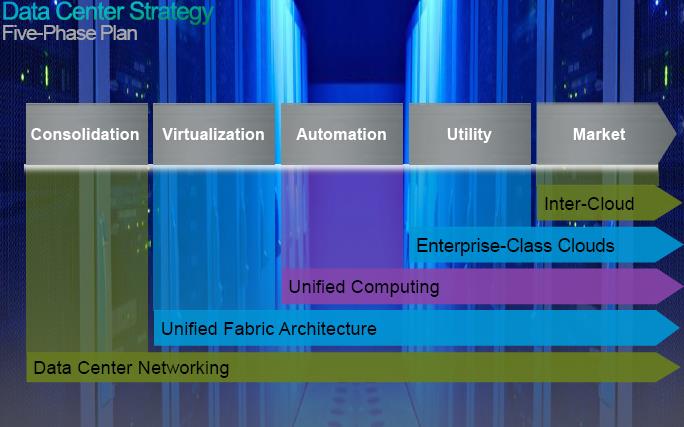
Raeber (2012) has also pointed out that if firms such as ATIC fails to move forward with orchestration of performance with cloud computing in order to cope up with the technological advancement throughout the world, then because of not aligning with IT infrastructure, they would have to face a number of different set of troubles. These troubles may arise from every area of their business operations; however, the key troubles are classified in the chart below:
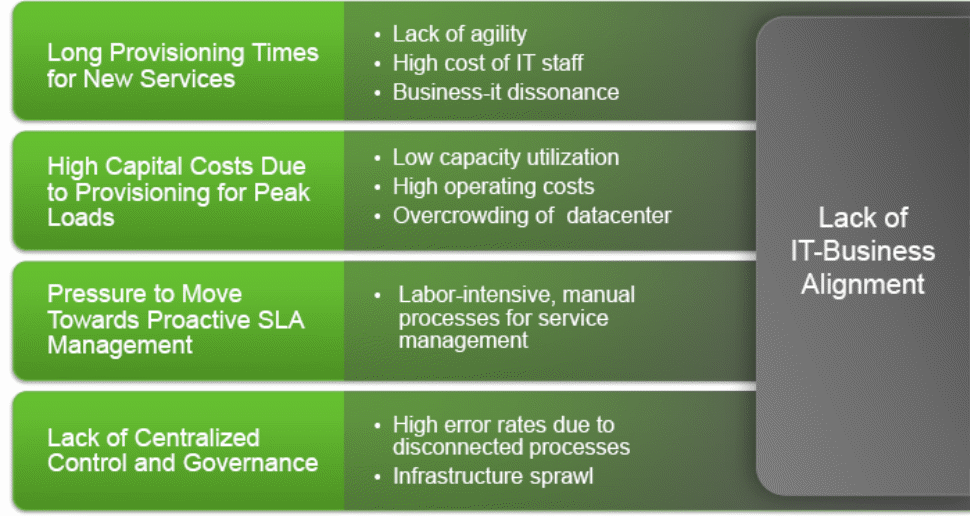
The following figure shows the importance and key benefits of orchestration of performance with cloud computing for ATIC; it shows in a chart how the company will be advantaged by adoption of the concept in its business:
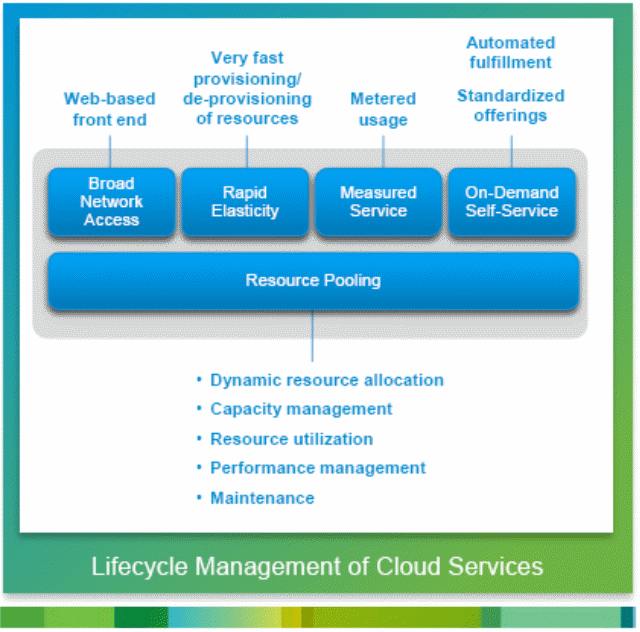
ATIC can take advantage of this IT infrastructure by using public, private, or hybrid cloud in areas of business value, differentiation, system excellence, and innovations; moreover, the orchestration will be fully secure, open, efficient, and mobile as shown in the figure below:
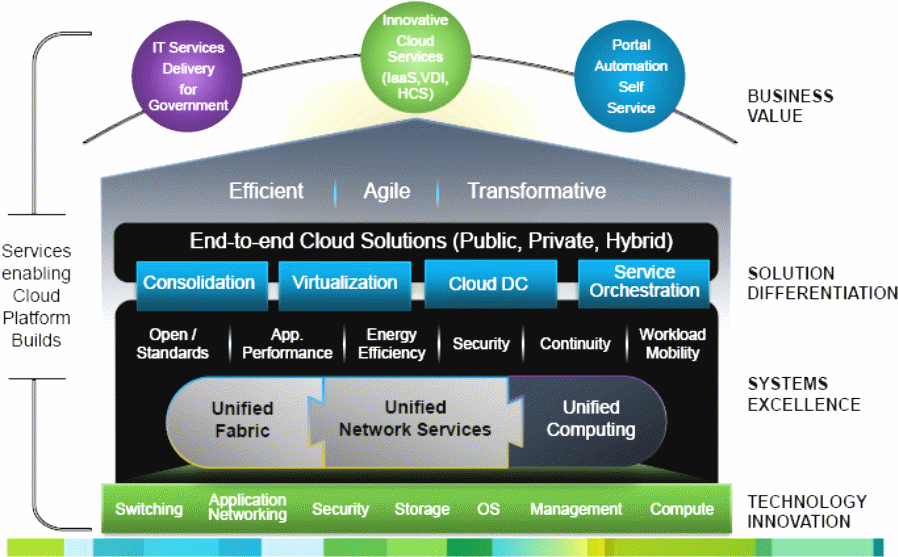
Conclusion
The competitive advantages of ATIC in logistics segments rely on the capability to control complex supply chain and innovation; however, there are many suppliers in global market provide different solutions to coordinate the tasks in accordance with the needs of the company. At the same time, this report has identified different barriers of ATIC to manage complex supply chain with existing operational system and human resources; therefore, this report suggests ATIC several solutions and models for orchestrating supply chain performance.
This report illustrated the view of the previous researchers on orchestrating performance and identified that orchestration is the perfect process to find out risks and take action accordingly. As there was no fruitful research on orchestrating performance of ATIC, this report will contribute in future research works on this field to innovate a typical solution to encounter concurrent problems related with supply chain management, human resources management and so on.
Recommendation
This company should consider several factors in order to select proper solutions, such as, the effectiveness of existing IT system, organizational structure in the global market, the purchasing power, and economies of scale, and so on. At the same time, ATIC should build adaptive SCM, which will be more flexible and responsive; in addition, it should have the opportunity to change the system to reduce the complexity of the SCM to integrate and coordinate the tasks to lead global semiconductor industry.
In addition, this company should jointly work with the local government to develop integrated platform for SCM to develop trade information system with different value-added services both for the customers and for stakeholder of ATIC. A significant part of the total employees of ATIC are not well experienced and unable to adopt new technology; in this context, it should concentrate on knowledge- development training programs and other educational facilities while the company would integrate new technology to develop manufacturing, SCM and other operational system.
Reference List
ATIC (2014). ATIC Vision. Web.
Balakrishnan, M. S. & Moonesar, I. (2012). Advanced technology investment company (ATIC): a destination global champion. Web.
DeAngelis, S. (2011). On the Bandwagon: Supply Chain Orchestration. Web.
Ennulat, S. (2013). Developing a collaborative supply chain strategy. Web.
Erl, T. (2008). Service-Oriented Architecture: Concepts, Technology & Design. New Jersey, USA: Prentice Hall.
GT Nexus. (2014). GT Nexus offers the most comprehensive solution for Supply Chain orchestration. Web.
Hruska, J. (2012). Deliberate excellence: Why Intel leads the world in semiconductor manufacturing.
IBM. (2009). Orchestrating the chain Smarter supply chain performance management for life sciences companies. Web.
Jharkharia, S. & Shankar, R. (2005). IT-enablement of supply chains: understanding the barriers. Journal of Enterprise Information Management, 18(1), 11 – 27.
Loesgen, E. (2014). Orchestration. Web.
Muller, R. (2009). Hope for crisis-hit chip industry.
Onisick, J. (2011). Private Cloud Automation, Orchestration, and Measured Service.
Raeber, R. (2012). Cloud Orchestration.
Sadiq, W. & Racca, F. (2010). Business Services Orchestration: The Hypertier of Information Technology. Cambridge, UK: Cambridge University Press.